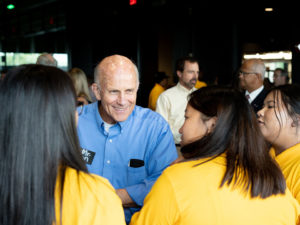
Dan Sullivan has found community among the youth he mentors at Cookie Cart in Minneapolis. Photo courtesy of Cookie Cart
Nestled in among North Minneapolis’ tough, gang-patrolled neighborhoods, Dan Sullivan has found his retirement sweet spot. It’s called Cookie Cart, a place that churns out more than 400 dozens of cookies a day — and equips hundreds of neighborhood teens with real work experience, leadership skills and financial know-how.
The retired economics professor doesn’t do much baking, sifting or measuring. Instead, Sullivan helps the youth with financial skills, like setting up bank accounts and saving for short- and long-term needs. Perhaps more importantly, he helps them see life’s possibilities beyond high school and beyond the mean streets of their neighborhoods. In so doing, he has found that he himself is stretching beyond his own life experiences.
“When I was in academia, the idea was to get students to come to me so I could teach them — I have the truth and you want the truth from me,” Sullivan observes. “Now, it’s just the opposite — I’ve got to understand you, where you are, and what you want, and how I can help you reach that.”

Cookie Cart gives teens 15 to 18 years old in Minneapolis and St. Paul the opportunity to learn essential job, leadership and life skills that open opportunities for building a better life. Photo courtesy of Cookie Cart
The Cookie Cart has been transforming the lives of youth — and adults like Sullivan — since its formation in 1988. But it actually began long before in the 1970s with Sr. Jean Thuerauf, a Mercy Missionaries nun who opened her doors to young kids to get them off the streets even for a few hours. While she baked cookies, they did their homework and talked to her about their troubles.
Today, Cookie Cart employs 200 teens in Minneapolis and more than 100 in St. Paul, all while giving them critical job skills, financial literacy, and leadership experience. They not only measure, sift and bake, they learn the ins and outs of the whole operation, from filling a mop bucket to customer service to packaging and fulfilling orders for up to 1,500 dozen cookies a day during the peak holidays.
The youth who come through the doors of Cookie Cart often come from broken homes that struggle with poverty, says Stacy Schleeter, educational program senior manger. They are mostly African American, Latino, Hmong and come from African immigrant and refugee families. They don’t want to follow peers into the juvenile justice or school disciplinary systems. They want something different for their lives.
They certainly weren’t the kind of kids Sullivan was familiar with — nor was he someone they often encountered outside the harsh, authoritarian form of teachers and police officers.
“In their community, I’m the prototype of the person not to be trusted,” Sullivan notes.
Sullivan came to the Ignatian Volunteer Corps soon after his retirement as an economics professor at the University of Minnesota two years ago. He wanted to find a place where he could have a positive impact on the lives of young people. In his application, he noted that “being part of a community (and) becoming more thoughtful and sensitive to the needs of others” were areas he wanted to grow in.
Opportunity for that growth began almost as soon as he started his service year with Cookie Cart. The original plan to have him man a computer lab quickly fell to the wayside when few kids took advantage of the lab.
 “I told them let me do whatever needs doing and become a presence in the kids’ lives,” Sullivan recalls. “Instead of sitting and waiting for them to come to me, which is boring, I started hanging out and talking with them and being genuinely interested.”
“I told them let me do whatever needs doing and become a presence in the kids’ lives,” Sullivan recalls. “Instead of sitting and waiting for them to come to me, which is boring, I started hanging out and talking with them and being genuinely interested.”
He helped hone the financial literacy program to include practical knowledge of money handling, since many of the teens had very little to no experience in opening bank accounts or deciding the best way to cash a paycheck. But his role quickly expanded to mentoring the youth to consider the myriad opportunities before them, not just in getting jobs but also in acquiring a higher education.
Some of the teens he encountered even struggled with such fundamental tasks as writing down their address. They didn’t know where to call home, Sullivan says. In one instance, a youth had been asked to sign a form, but he didn’t know what a signature was. So he spent a few hours excited to figure out what his signature would be, Sullivan laughs.
“The reason to learn these skills is to open up possibilities,” Sullivan adds. “But you have to know what the possibilities are first … so you can find a different path.”
For the teens, possibilities were limited to the kinds of lives they saw in their neighborhood. Sullivan wanted to expand their view.
“If there’s one thing I can do, I can provide them a vision,” he says. “So I’d ask them to tell me what they’re interested in and I’d paint a picture of where they can be.”
If they liked photography, he’d help the teens envision themselves as a photographer for National Geographic or a fashion magazine.

Stacy Schleeter, Cookie Cart’s educational program senior manger, works with youth in the facility’s computer lab. Photo courtesy of Cookie Cart
As the teens worked together, they learned to break down stereotypes of their peers, some of whom would have been rivals on the neighborhood streets. And as they learned to see their peers in a different light, Sullivan helped them discover that older, white men could be different from the ones they usually encountered with the law.
“He carries his whiteness around pretty well around the community,” Schleeter jokes. “He’s good at being the one to break stereotypes and not fault individuals for their fears” of what an older, white male is.
“Dan has really built relationships with the young people,” she says, adding that teens often call out to “Mr. Dan” to address their questions. “It happens because he’s seen as a caring person and because he’s always there.”
Volunteers come and go, often just staying for a few hours at Cookie Cart, Schleeter says. But not Sullivan. “There’s a consistency in his presence, and his just being there is so rewarding to our young people.”
It’s that kind of community that Sullivan has longed for. “I was interested in building community,” he says, “not just going in and doing something, but also of being part of a community that is doing something.”
